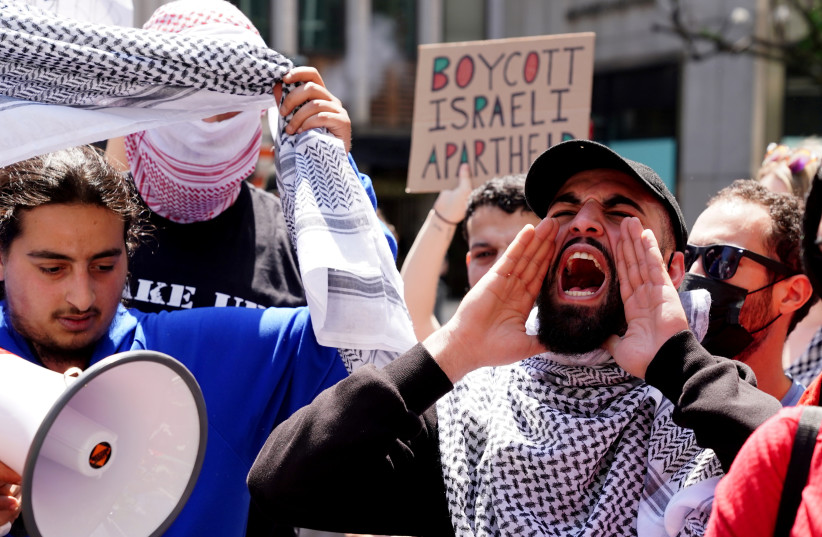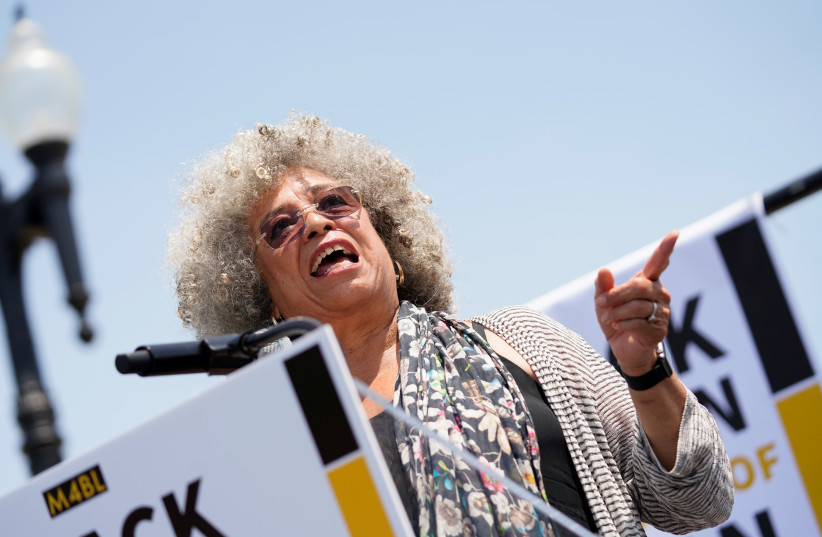Over the last two decades, academic spaces that had once been open for lively and heated conversations about differing opinions have become increasingly isolating and homogeneous, leaving little room for accepting those with whom you disagree, Corinne E. Blackmer states in the premise of her new book, Queering Anti-Zionism.
In Queering Anti-Zionism, Blackmer examines the way in which the BDS movement has taken over the world of academia, in particular the world of queer and feminist studies.
In 2008, Blackmer, a professor of English and Judaic studies at Southern Connecticut State University, came face to face with the discrimination that many Jewish academics endure, despite never having publicly announced her Zionist beliefs prior to that point.
However, as an openly Jewish and openly gay woman, she became the target of a series of homophobic and antisemitic hate crimes over the course of several months, paving the way for her to explore the connection between LGBTQ+ identities and the Israeli-Palestinian conflict, specifically within the confines of academic freedom and campus activism.
The infringement on academic freedom
In her introduction to the book, Blackmer states that while the book acknowledges and attempts to do justice to opinions on many sides of the conflict, she believes that the BDS movement is “an infringement on open expression and academic freedom,” which in turn “undermines the respect for complex issues for which there are no right or wrong answers.”

The theme of the Israeli-Palestinian conflict having no simple answers runs throughout the book as Blackmer examines the complex identities of LGBTQ+ Palestinians and Israelis and the reality that exists on the ground, as well as the black-and-white thinking of many anti-postmodernist academic activists when it comes to Israel.
Through examining the works and writings of Sarah Schulman, Jasbit Puar, Angela Davis, Dean Spade and Judith Butler, Blackmer paints a picture of progressive academic thinkers who have all produced profoundly impactful works in their own right, but who seem to fall at the hurdle of treating Israel, and the ongoing Israeli-Palestinian conflict, with the same respect and open-mindedness with which they treat their other subjects.
In challenging Jewish anti-Zionist Schulman’s beliefs that the solution to the 75-year conflict is for Jews to give up any ideals of wielding state power and in proving wrong the lies of Rutgers University Prof. Puar’s book The Right to Maim, Blackmer challenges the work of these academic activists by employing a tool that they have all cast aside – healthy debate.
Rather than shutting down the arguments of these academics with a quick cry of accusing them of bigotry (something Blackmer says both sides are guilty of doing), she presents counterarguments through the use of compelling evidence and the lived experiences of queer Israelis and queer Palestinians alike.
A cynical outlook on Israel's queer communities
For example, Puar, in The Right to Maim, accuses Israel of cynically using its gay and lesbian population to justify and even contribute to the suffering of Palestinians. In making this claim, Puar concludes that the Israeli government only cares about gay and lesbian people insofar as “they can become parents and thus reproduce the state ‘through the biopolitics of population reproduction,’” Blackmer explains.
Rather than simply shooting down Puar’s claim with an equally blunt counterclaim, Blackmer examines her point, highlighting the ways in which it is incorrect, and offering evidence to contradict it.
Through looking at the long and arduous struggle that LGBTQ+ Israelis have to go through to become parents, whether it be through adoption, surrogacy or other fertility routes, Blackmer discredits Puar’s bold claim that Israel loves gay and lesbian people for their ability to produce more children for the state, providing evidence where Puar failed to.
Whereas pro-BDS activists are not interested in, and actively discourage, holding open debate or space for understanding where the other side is coming from, throughout Queering Anti-Zionism, Blackmer approaches those she criticizes with an open mind to understand where they came from and how they arrived at their conclusions.
Angela Davis and the lack of intersectionality
Examining the work of Angela Davis, Blackmer acknowledges how a woman like Davis ended up becoming radicalized at such a young age. Born in 1944 in segregated America, Davis looked to the Soviet Union, which, from afar, painted a glimmering picture of equality and full social and civil rights for a young black woman.

Blackmer doesn’t criticize Davis for coming to this conclusion; rather, she seems to sympathize with the struggles that she had gone through, and instead turns her criticism to who Davis is today, long after the Soviet Union was revealed as the oppressor of human rights and freedoms that it was.
Today, Davis is a staunch advocate for BDS and is one of the key activists who worked to link the movement to the American-based Black Lives Matter movement.
The false connection that Davis has forced between the two movements (one of which calls for the removal of the Jewish people from Israel and a return to pre-1948 land, and the other of which calls for the equal treatment of black people in the United States) has, said Blackmer, alienated “pro-Zionist Jews who had always played seminal roles in social justice movements.”
Davis, whose work in the field of intersectionality theory cannot go unnoted, seems to throw her own standards out of the window when it comes to Israel, Jews and the Palestinian conflict.
Through her absolute lack of intersectionality and nuance when it comes to these matters, Davis gives Jewish Americans “the non-choice of abandoning their Zionist allegiance to Jewish national self-determination in Israel or embracing the unremittingly harsh views of the Jewish state in order to remain in her movement,” Blackmer criticizes.
Throughout Queering Anti-Zionism, Blackmer presents the argument through evidence-based claims and research that, no matter what a person’s beliefs on the Israel-Palestinian conflict are, the BDS movement should not be given the space to flourish, as it will always do more harm than good.
“We have seen how this movement [BDS] jeopardizes academic freedom and how it rejects dialogue that aims at creative resolution and resilient adaptation to constrained circumstances.”
Corinne E. Blackmer
“We have seen how this movement [BDS] jeopardizes academic freedom and how it rejects dialogue that aims at creative resolution and resilient adaptation to constrained circumstances,” she writes in the book’s conclusion.
“Analysis that classifies social practice as compelled to fall on one or another side of an unbridgeable divide risks producing silences, master narratives and exclusions, while ignoring reality that constructs multiple identities.”
Blackmer’s Queering Anti-Zionism does no such thing, and instead uses the reality of the multifaceted identities of queer Israelis and Palestinians to create a masterful argument against the world of the academic boycott of Israel.
Queering Anti-Zionism
By Corinne E. Blackmer
Wayne State University Press
222 pages; $29.95
